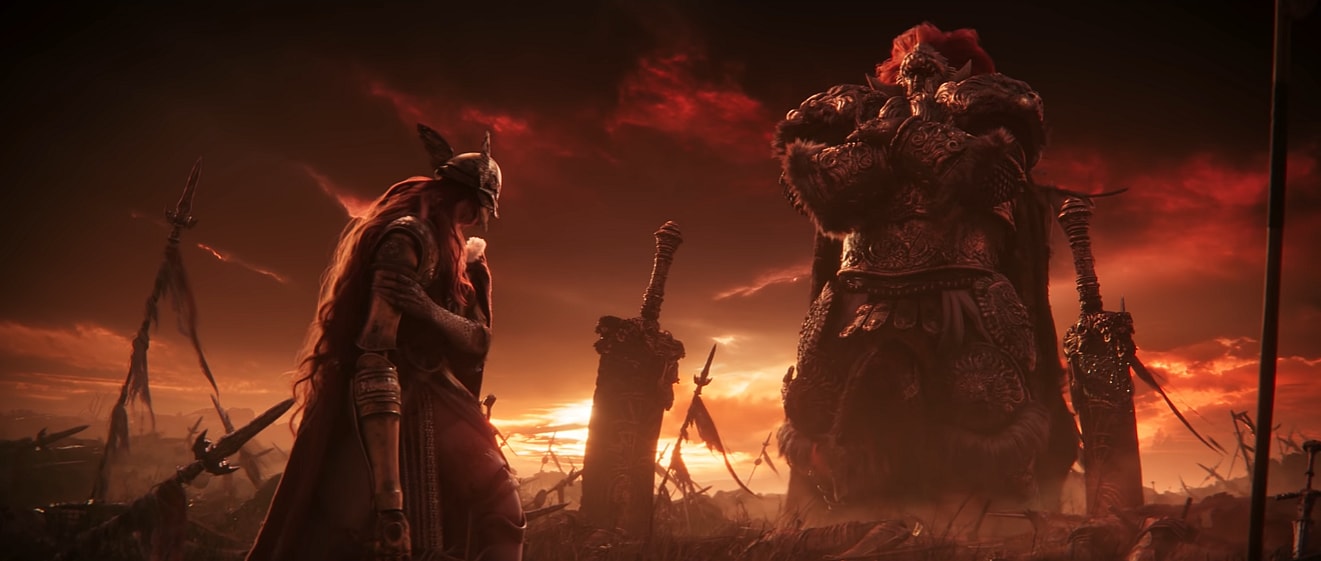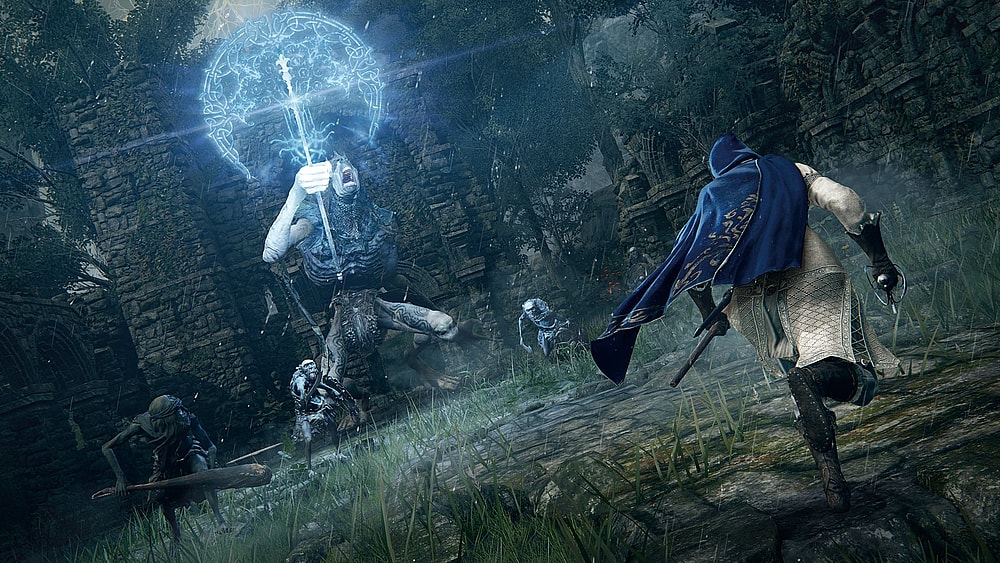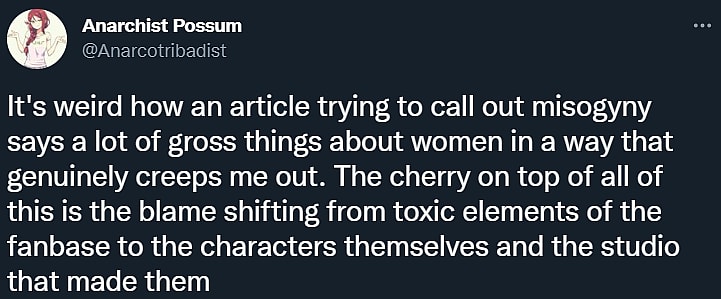Polygon Claims ‘Elden Ring’ Boss Malenia “Embodies FromSoftware’s Problems With Women”

Polygon’s cry that Malenia in Elden Ring is the “embodiment” of FromSoftware’s sexism has been met with push back from players.

RELATED: Kadokawa Begins Serialization Of New Hilarious ‘Elden Ring’ Gag Manga
Polygon made the bold claim “Elden Ring’s Malenia embodies FromSoftware’s problems with women.” While a challenging boss with imposing presentation, they argue she “exemplifies the way FromSoft writes women in its games,” and that all female characters in their games share “a specific brokenness; disfigurement, abandonment, and loss.”
“They are afflicted by gender, and the ‘cure’ for when they are obstacles instead of mutely helpful is for the player to enact succinct violence,” says Polygon, who further asserts that these female characters are “a particular kind of idealized femininity, as fantastical as the foreboding castles and giant trees — demure, quiet, void of needs or motivations — an echoed presence of dolls, mothers, and even help-meets who guide the player along.”

In short, Polygon claims FromSoftware’s female characters usually have physical disability or mental trauma, and are emotionally “muted” in some manner. This applies to helpful NPCs or bosses that exude “masculine stoicism,” except when the former becomes the latter “before erupting into a shrieking, horrifying hysteria when encountered in combat.” Motifs with dolls and motherly figures were also noted.
Even though Polygon state Soulsborne players welcome female characters even when driven to frustration over them being challenging to fight, “that affection feels based on that empty, emotionless state, or reduces them to infantilized ‘waifus,’ you realize that hostility and that fondness spring from the same deep sexist roots, twins intertwined.”

They then cite Inverse’s Matt Kim and his “Why Are Female Characters in ‘Dark Souls’ Games Quiet and Alien?” editorial. Kim proposed that much like the archetype in anime, “these characters are actively fetishized for their outer-worldliness.”
“Their lack of a broad emotional spectrum is part of their appeal.” Said characters also also “more resilient than everyone else in their story — perhaps, because they are unburdened by emotions. Yet one could also argue that their lack of ’emotions,’ used here as an unfortunate euphemism for men’s conception of female shortcomings, makes it easier to believe they are capable of such great strengths,” Kim claims.

Polygon continues, stating “the audience’s hostile and competitive attitudes about it [Maleina’s fight] are often steeped in gendered toxicity,” citing social media posts and videos using “sexist slurs” when talking about it.
That would be players using less valid tactics supposedly had them being called a “pussy” (though that comes from “pusillanimous,” rather than female genitalia) while “success over her took on a weird masculinized chest-beating at times.”

Polygon even claim “This boss fight creates friction between the developer’s ideas about gender and its ideas about enabling a power fantasy. It creates a weird performance when the game encourages players to embrace failure. This is only heightened by Malenia’s character design.”
They claim the “bravado about beating Malenia” comes in part from her design being inspired by “the idea of a virginal warrior like Joan of Arc or Brienne of Tarth, her purity and strength existing in a place beyond femininity,” along with references to figures such as Athena or the Valkyries. Rather than be overjoyed at beating a difficult boss, Polygon claims male players are happy to have overcome a strong female character.

“When faced with a difficult, defiant woman who has never been beaten, men cannot help but fantasize about being the one to take her down. (Or at least be in the room when it happens.)” Polygon also argues FromSoftware relying on more being scattered through item descriptions and NPC dialogue also “reinforces fans’ biases toward Malenia,” arguing most of her lore comes from an earlier story trailer.
Even then, Polygon argues Malenia’s backstory undercuts her impact- having to practically detonate a plague of Scarlet Rot across the land in a last-ditch attempt to kill Radahn and claim the title of Elden Lord. “What’s the scariest thing a team of designers could dream up? A distant warrior woman who doesn’t care about them, slowly succumbing to a rot that infected her from birth.”

“What could have been a place for mechanical and narrative evolution backslides into being merely a means to an end within a video game. Women continue to populate the path as either passive help-meets or predictable obstacles, which the fan base is all too happy to step over,” Polygon argues.
“While FromSoft’s games are often intriguing meditations on the corrupting influence of power, the inevitability of death, and the lurking dread of cosmic horror, the women in them feel stunted. Malenia is a half-grown idea clipped back too short. What could have been is left on the floor of the Haligtree, cocooned in petals, and deeply dreaming of revenge.”

Fans of Elden Rings and cynics of Polygon didn’t take kindly to the editorial. The general consensus appeared to argue Polygon wrote the article purely as clickbait, picking a popular character or game and saying it was sexist or flawed. Others took direct issue with Polygon’s argument.
“You realize that Fromsoft does the exact same things with men right? Have them mutate, or be absurdly hard bosses, or be really sad and distant? It’s not sexist it’s egalitarian,” @HimeOnion argued.

“The assumption that fromsoftware’s female characters are designed for the appeasement of male fans and not because these characters can simply be allowed to exist is far more sexist that whatever issue this article is trying to pretend exists,” @techytagPP suggests.
They later added how they found FromSoftware characters “empowering,” because of the care put into writing them as standing strong in the broken world around them, not for fan-service as other games do. They also note how they have motivations, rather than being damsels in distress.

Even those who partly agreed with Polygon’s editorial took issues with other parts of their argument. “It’s weird how an article trying to call out misogyny says a lot of gross things about women in a way that genuinely creeps me out,” @Anarcotribadist confesses. “The cherry on top of all of this is the blame shifting from toxic elements of the fanbase to the characters themselves and the studio that made them.”

“That Polygon article about Malenia is extremely sexist. It argues that Malenia was not difficult of her own merit, but because players were frustrated by fighting a woman. If [sic] argues that the mere existence of a woman’s body is inherently sexual,” @PsychoCutNess counter-argues.

“Malenia is not show in any sexual position or angle. She is naked in the second phase to symbolize her rebirth,” @PsychoCutNess hypothesizes. “To argue this sexualizes her is to argue that women’s bodies are inherently sexual. Disgusting.”

“Malenia is one of the fiercest warriors who ever lived. I don’t look at her with disdain because she’s a woman,” @nosleep1138 refuted. “I do so because she doomed an entire region simply because she refused to lose. She should’ve picked her battles, much like you lot.”

Unlike Malenia, no one elected to solo Polygon, collectively making over 1,300 comments, and nearly 1,600 retweets on Twitter (1,442 of them being quote retweets). Even so, the initial tweet netted over 1,900 likes.
